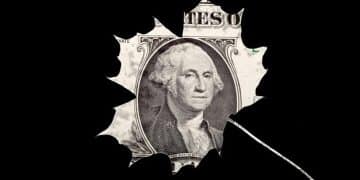The Ethics of Political Consultants: Scandal Culture Contributors?

The ethics of political consultants are under scrutiny as their strategies, sometimes involving misinformation and aggressive tactics, raise concerns about contributing to a culture of political scandal and eroding public trust in the U.S. political process.
The political landscape is often shaped behind the scenes by the ethics of political consultants: are they contributing to a culture of scandal? These individuals wield significant influence, crafting narratives and strategies that can sway public opinion and determine election outcomes.
The Role of Political Consultants in Shaping Public Opinion
Political consultants play a vital role in modern elections, offering expertise in campaign strategy, messaging, and voter outreach. Their work can be instrumental in helping candidates connect with voters and articulate their platforms effectively.
However, the influence of these consultants also raises ethical concerns. The pursuit of victory can sometimes lead to tactics that blur the lines of integrity and honesty, prompting questions about their responsibility in fostering a culture of scandal.
Defining the Scope of Influence
Political consultants are involved in various aspects of a campaign, including:
- Developing campaign messaging and slogans
- Conducting polling and market research
- Creating advertising and media strategies
- Organizing campaign events and rallies
The Power of Narrative Control
One of the most significant ways consultants influence public opinion is through narrative control.
- Crafting compelling stories that resonate with voters
- Framing issues in a way that favors their candidate
- Using emotional appeals to sway public sentiment

In conclusion, political consultants heavily influence how political campaigns are run and how information is presented to the public, holding immense power in the electoral process.
Ethical Dilemmas Faced by Political Consultants
The work of political consultants involves navigating a complex web of ethical dilemmas. These professionals often face pressure to win at all costs, which can lead to questionable decisions that compromise their integrity.
Balancing the need to advocate for their clients with the responsibility to uphold ethical standards presents a constant challenge. The lack of strict regulations and oversight further exacerbates these dilemmas.
Misinformation and Negative Campaigning
The use of misinformation and negative campaigning tactics is a significant ethical concern.
- Spreading false or misleading information about opponents
- Launching personal attacks and smear campaigns
- Distorting facts to create a negative perception
Conflicts of Interest and Transparency
Conflicts of interest and lack of transparency are other critical challenges.
- Representing multiple clients with conflicting interests
- Failing to disclose financial ties and affiliations
- Operating behind closed doors without public scrutiny
In conclusion, political consultants often face tough ethical decisions, especially related to misinformation, transparency and conflicts of interest.
The Rise of Scandal Culture in Politics
Scandal culture in politics refers to an environment where scandals are not only common but also normalized and even expected. This culture can erode public trust and undermine the legitimacy of democratic institutions.
Political consultants, with their ability to shape narratives and influence public opinion, can inadvertently or intentionally contribute to this culture. Their actions can normalize unethical behavior and further polarize the political landscape.
Media’s Role in Amplifying Scandals
The media plays a crucial role in amplifying political scandals, which contributes greatly to political turmoil.
- Sensationalizing news stories to attract viewers or readers
- Focusing on scandals rather than substantive policy issues
- Creating a climate of cynicism and distrust in government
The Impact on Public Trust
The constant barrage of scandals and negative news can have a devastating impact on public trust, leading to:
- Disillusionment with the political process
- Decreased voter turnout and civic engagement
- Increased polarization and social division
In conclusion, the media amplifies the impact of scandals on the general public, ultimately reducing public trust in the political process.
Case Studies of Political Consultant Ethics
Examining specific cases can provide valuable insights into evaluating political consultant ethics and their impact on political culture.
These cases illustrate the ethical gray areas that consultants often navigate and the potential consequences of their actions.
The Cambridge Analytica Scandal
The Cambridge Analytica scandal is a notable example of ethical boundary overreach.
- The firm harvested data from millions of Facebook users without consent.
- That Data was used for targeted political advertising and influence campaigns.
- The incident raised serious questions about data privacy and manipulation.
The Use of “Dark Money” in Campaigns
The use of “dark money,” or undisclosed funds, in political campaigns also raises concerns, since:
- It allows wealthy donors to influence elections anonymously.
- It hides the true sources of funding for political ads and campaigns.
- It raises questions about transparency and accountability.

In conclusion, several case studies highlight the ethical issues that arise when political consultants overstep boundaries, affecting fairness of the entire political landscape.
Regulations and Oversight of Political Consultants
The regulation and oversight of political consultants vary widely across different countries and jurisdictions. In the United States, regulations primarily focus on campaign finance and disclosure requirements.
However, there are ongoing debates about whether these regulations are sufficient to address the ethical challenges posed by political consultants. Critics argue for stronger oversight and enforcement mechanisms.
Campaign Finance Laws
Campaign finance laws aim to regulate the flow of money in political campaigns.
- Setting limits on individual and corporate contributions
- Requiring disclosure of campaign donors and expenditures
- Enforcing rules against bribery and corruption
Professional Codes of Conduct
Some professional organizations have developed codes of conduct for political consultants:
- These codes outline ethical principles and standards of practice.
- However, adherence to these codes is often voluntary.
- There are limited enforcement mechanisms.
In conclusion, while regulations and professional guidelines exist, increased government oversight is desired for the industry to promote compliance and prevent unethical practices.
Moving Towards a More Ethical Political Culture
Creating a more ethical political culture requires a multifaceted approach involving individuals, organizations, and governments.
Raising awareness about ethical issues, promoting transparency and accountability, and fostering a culture of integrity are all essential steps in this process.
Education and Awareness
Education and awareness campaigns can help to:
- Inform the public about the role and influence of political consultants
- Raise awareness about ethical dilemmas and challenges
- Encourage critical thinking and media literacy
Promoting Transparency and Accountability
Promoting transparency and accountability is crucial. Important steps could be to:
- Strengthen disclosure requirements for campaign finance and lobbying
- Increase oversight and enforcement of ethical standards
- Establish independent ethics commissions and watchdogs
| Key Point | Brief Description |
|---|---|
| 🤔 Ethical Dilemmas | Balancing client advocacy with ethical standards. |
| 📰 Rise of Scandal Culture | Normalization of scandals eroding public trust. |
| 🏛️ Regulation and Oversight | Varying laws aim to regulate campaign finance. |
| 💡 Ethical Culture | Promoting integrity and accountability in politics. |
Frequently Asked Questions
▼
Political consultants provide services like strategy, messaging, and outreach. They advise candidates on how to connect with voters and manage their campaigns efficiently.
▼
Consultants often face issues like misinformation, representing conflicting clients, and a lack of transparency about funding, creating concerns about loyalty and honesty.
▼
Media focuses on sensational news, potentially distorting events. This coverage highlights scandals and can lessen coverage of other important policy topics.
▼
“Dark money” refers to funds used without revealing its source, which obscures influence and creates an unfair situation and reduces accountability overall.
▼
Ethical culture can be promoted through education, greater transparency about funding, compliance with standards, and the creation of independent oversight for the political system.
Conclusion
In conclusion, while political consultants play a crucial role in shaping political discourse and election outcomes, their actions must be guided by a strong ethical compass. By promoting transparency, accountability, and integrity, we can work towards a political culture that fosters trust and serves the public interest.





